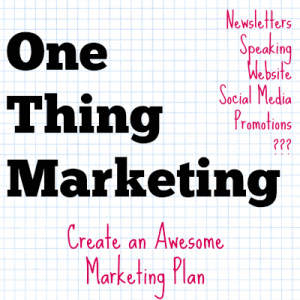 A few weeks back, we began a series on creating an awesome marketing plan for your novel’s proposal. The goal is not only to wow agents and editors with your stellar marketing expertise, but also once published to be able to take this plan and put it into action.
A few weeks back, we began a series on creating an awesome marketing plan for your novel’s proposal. The goal is not only to wow agents and editors with your stellar marketing expertise, but also once published to be able to take this plan and put it into action.
Earlier posts include:
Part 2: Media and Speaking Engagements
Today, we’re going to talk about the biggie:
Internet Presence
I helped teach a workshop recently during which one attendee proudly declared, “I’m not on the Internet.” Little hint: That’s not going to work in an author marketing plan. Not these days.
But even if your internet presence isn’t as hefty as you’d like it to be, it’s still important to let agents and editors know you are savvy about the online world and you’ve at least begun the process of carving out a place for yourself in that world. (Sidenote: My editor found me through my online presence–both Twitter and my blog. So it’s important to begin building this piece of your marketing strategy before you have a book contract!)
I’ll tell you, I’ve never had an agent or editor ask for my specific social media numbers but the first time I visited my publisher’s offices after signing contract, multiple people commented on my website. They’d read my blogs, even watched my vlogs and several people pointed out things they’d read in the bio on my website. One of the biggest things they noticed? The engagement on my website. The fun conversations happening on my blog.
So even if you don’t have incredibly high social media numbers, that’s not always the most important thing. It’s the quality of your content and the engagement of the followers you do have that really stands out, especially on the fiction side. (On the nonfiction side, yes, they are looking for BIG numbers!)
So here are the elements to include in the Internet Presence portion of your marketing plan:
Website or blog: Include how often you blog, what kind of topics you cover, what kind of traffic you receive.
Facebook: It’s probably smart at some point to begin a Facebook Page rather than depending on your profile, but whatever route you choose to go, include a sentence or two about your Facebook activity.
Twitter: If you’re on Twitter (which I would definitely recommend!), talk about how often you tweet, what kind of tweets you write, and your plans for growing your following.
Goodreads: I’d be hesitant to say anyone MUST be on any particular platform (although, Facebook and Twitter are pretty basic and obvious choices), but Goodreads just makes sense if you’re a writer. It’s where readers congregate! Before you have a book published, it’s a great idea to join the site and get involved in groups, conversations, etc.
Pinterest / Instagram / G+ / YouTube / etc: What other social media platforms do you use? Personally, Pinterest drives me up a wall, but I love Instagram. I’m just getting the hang of G+ and I’ve experimented with but never really hugely focused on YouTube.
As I noted above, I’ve never had an agent or editor ask for my specific numbers, but I’ve heard from more and more friends that their agents or potential editors are asking for these numbers. Personally, if you are asked to list numbers, I think it pays to then go beyond the number. Talk about what kind of engagement you see across your platforms, what kind of content you post, what your plans are for growing your online platform…let the agent or editor know you aren’t just posting willy-nilly, but you actually have a strategy for your social media content.
Klout: Sometimes agents or editors will ask for your Klout score. Klout is an app that uses your social media analytics to rank your online influence. Sometimes I think it’s a little too easy to manipulate your “Klout Score” but nonetheless, if an agent or editor asks for this score, you’ll want to provide it. You can sign up for a Klout account easily at Klout.com.
A savvy marketer knows the internet presence portion of your marketing plan should go beyond social media platforms. Here are some other internet presence blurbs to include:
Group blogs: Do you regularly post articles as part of one or more group blogs? Make sure to include that and if you’ve had some really great engagement, perhaps even include links to your most-read pieces.
E-zines and other online articles: Include any other online writing you’ve done for e-zines or popular websites. Also list online publications you plan to approach once your book has released.
Blog tours: Let the publisher know you plan to help coordinate a blog tour once your book is out. Many publishers will arrange their own blog tours through existing book blogger and review programs. But it never hurts to line up your own appearances, as well.
Connections: List any other strong internet connections you may have that could be beneficial when your book releases. This could be sites where you’d like your publisher to consider running web ads or doing giveaways, etc.
To sum up, the internet presence piece of your marketing plan is about so much more than a group of numbers. It’s about letting your prospective agent or publisher know you understand the importance of having an online presence, that you have a strategy and that you plan to do your part in growing your online exposure.
Do you have any questions about the internet presence portion of your author marketing plan?
Join us in two weeks for a look at how libraries and launch teams add an extra boost to your marketing efforts.